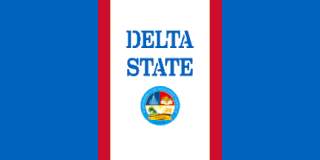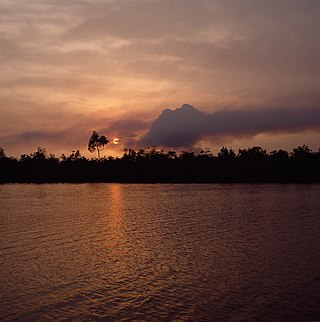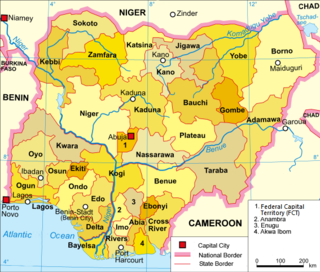Related Research Articles

A natural disaster is the highly harmful impact on a society or community following a natural hazard event. Some examples of natural hazard events include: flooding, drought, earthquake, tropical cyclone, lightning, tsunami, volcanic activity, wildfire. A natural disaster can cause loss of life or damage property, and typically leaves economic damage in its wake. The severity of the damage depends on the affected population's resilience and on the infrastructure available. Scholars have been saying that the term natural disaster is unsuitable and should be abandoned. Instead, the simpler term disaster could be used, while also specifying the category of hazard. A disaster is a result of a natural or human-made hazard impacting a vulnerable community. It is the combination of the hazard along with exposure of a vulnerable society that results in a disaster.

Federal Emergency Management Agency (FEMA) is an agency of the United States Department of Homeland Security (DHS), initially created under President Jimmy Carter by Presidential Reorganization Plan No. 3 of 1978 and implemented by two Executive Orders on April 1, 1979. The agency's primary purpose is to coordinate the response to a disaster that has occurred in the United States and that overwhelms the resources of local and state authorities. The governor of the state in which the disaster occurs must declare a state of emergency and formally request from the President that FEMA and the federal government respond to the disaster. The only exception to the state's gubernatorial declaration requirement occurs when an emergency or disaster takes place on federal property or to a federal asset—for example, the 1995 bombing of the Alfred P. Murrah Federal Building in Oklahoma City, Oklahoma, or the Space Shuttle Columbia in the 2003 return-flight disaster.

James Lee Witt is a former director of the Federal Emergency Management Agency (FEMA), during the tenure of U.S. President Bill Clinton and is often credited with raising the agency's level of professionalism and ability to respond to disasters.

Delta State is a state in the South-South geopolitical zone of Nigeria. Named after the Niger Delta—a large part of which is in the state—the state was formed from the former Bendel State on August 27, 1991. Bordered on the north by Edo State, the east by Anambra and Rivers States, and the south by Bayelsa State, while to the west is the Bight of Benin which covers about 160 kilometres of the state's coastline. The State was initially created with 12 local government areas in 1991 which was later extended to 19 and now has 25 local government areas. Asaba as its state capital is located along the River Niger on the northeastern end of the State, while the state's economic centre is the twin cities of Warri and Uvwie.

Emergency management or disaster management is a science and a system charged with creating the framework within which communities reduce vulnerability to hazards and cope with disasters. Emergency management, despite its name, does not actually focus on the management of emergencies, which can be understood as minor events with limited impacts and are managed through the day-to-day functions of a community. Instead, emergency management focuses on the management of disasters, which are events that produce more impacts than a community can handle on its own. The management of disasters tends to require some combination of activity from individuals and households, organizations, local, and/or higher levels of government. Although many different terminologies exist globally, the activities of emergency management can be generally categorized into preparedness, response, mitigation, and recovery, although other terms such as disaster risk reduction and prevention are also common. The outcome of emergency management is to prevent disasters and where this is not possible, to reduce their harmful impacts.

Bayelsa is a state in the South South region of Nigeria, located in the core of the Niger Delta. Bayelsa State was created in 1996 and was carved out from Rivers State, making it one of the newest states in the federation. The capital, Yenagoa, is susceptible to high risk of annual flooding. It shares a boundary with Rivers State to the east and Delta State to the north across the Niger River for 17 km and the Forçados River for 198 km, with the waters of the Atlantic Ocean dominating its southern borders. It has a total area of 10,773 square kilometres (4,159 sq mi). The state comprises eight local government areas: Ekeremor, Kolokuma/Opokuma, Yenagoa, Nembe, Ogbia, Sagbama, Brass and Southern Ijaw. The state is the smallest in Nigeria by population as of the 2006 census. Being in the Niger Delta, Bayelsa State has a riverine and estuarine setting, with bodies of water within the state preventing the development of significant road infrastructure.

Edo, officially known as Edo State, is a state in the South-South geopolitical zone of the federal republic of Nigeria. As of 2006 national population census, the state was ranked as the 24th most populous state (3,233,366) in Nigeria. The estimated state population is around 4,777,000 in 2022. Edo State is the 22nd largest State by landmass in Nigeria. The state's capital and largest city, Benin City, is the fourth largest city in Nigeria, and the centre of the country's rubber industry. Created in 1991 from the former Bendel State, it is also known as the heart beat of the nation. Edo State borders Kogi State to the north for 133 km and across the Niger River for 81 km to the northeast, Anambra State to the east for about four km across the Niger River, Delta State to the southeast and south for 350 km, and Ondo State to the west.
Mitigation is the reduction of something harmful that has occurred or the reduction of its harmful effects. It may refer to measures taken to reduce the harmful effects of hazards that remain in potentia, or to manage harmful incidents that have already occurred. It is a stage or component of emergency management and of risk management. The theory of mitigation is a frequently used element in criminal law and is often used by a judge to try cases such as murder, where a perpetrator is subject to varying degrees of responsibility as a result of one's actions.

Natural disasters in China are the result of several different natural hazards that affect the country according to its particular geographic and geologic features affecting both humans and animals.
The Emergency Management Assistance Compact (EMAC) is a mutual aid agreement among states and territories of the United States. It enables states to share resources during natural and man-made disasters, including terrorism.
Collaborative Fusion, Inc. (CFI) was a Pittsburgh, Pennsylvania-based provider of ESAR-VHP and incident management software for coordination of emergency personnel. Its president and vice president were founders Atila Omer and Bryan Kaplan, respectively. CFI was acquired in 2011 by the Intermedix Corporation, a firm owned by private equity firm Thomas H. Lee Partners. Following the spin-off of Intermedix Corporation and Juvare, LLC in May, 2018, Collaborative Fusion, Inc. became a wholly owned subsidiary of Juvare, LLC, a firm owned by private equity firm Thomas H. Lee Partners.

The Administration for Strategic Preparedness and Response (ASPR) is an operating agency of the U.S. Public Health Service within the Department of Health and Human Services that focuses preventing, preparing for, and responding to the adverse health effects of public health emergencies and disasters. Its functions include preparedness planning and response; building federal emergency medical operational capabilities; countermeasures research, advance development, and procurement; and grants to strengthen the capabilities of hospitals and health care systems in public health emergencies and medical disasters. The office provides federal support, including medical professionals through ASPR’s National Disaster Medical System, to augment state and local capabilities during an emergency or disaster.
The California Governor's Office of Emergency Services is a California cabinet-level office responsible for overseeing and coordinating emergency preparedness, response, recovery and homeland security activities within the state. The agency was created by AB 38 (2008), superseding both the Office of Emergency Services (OES) and Office of Homeland Security (OHS).

The National Disaster Response Force (NDRF) is an Indian specialized force constituted "for the purpose of special response to a threatening disaster situation or disaster" under the Disaster Management Act, 2005. The "Apex Body for Disaster Management" in India is the National Disaster Management Authority (NDMA). The Chairman of the NDMA is the Prime Minister.

The 2012 Nigeria floods began in early July 2012. It killed 363 people and displaced over 2.1 million people as of 5 November 2012. According to the National Emergency Management Agency (NEMA), 30 of Nigeria's 36 states were affected by the floods and the two most affected areas were Kogi and Benue States. The floods were termed as the worst in 40 years, and affected an estimated total of seven million people. The estimated damages and losses caused by the floods was N2.6 trillion.

Clifford Ordia is a Nigerian engineer and politician who hails from Usugbenu Irrua in Esan Central local government area of Edo State. A Senator of the Federal Republic Of Nigeria from 2015-2023,who represented the people of Edo Central senatorial District, Edo State. in the Nigerian Senate and he is a member of the People's Democratic Party, PDP.

Edo State Polytechnic Usen is a higher institution of learning located in Usen community of Ovia South West local government area of Edo State, Nigeria. It was formerly known as Edo State Institute of Technology and Management (ESITM) Usen.
Natural disasters in Nigeria are mainly related to the climate of Nigeria, which has been reported to cause loss of lives and properties. A natural disaster might be caused by flooding, landslides, and insect infestation, among others. To be classified as a disaster, there is needs to be a profound environmental effect or human loss which must lead to financial loss. This occurrence has become an issue of concern, threatening large populations living in diverse environments in recent years.
The 2019 Osun State House of Assembly election was held on March 9, 2019, to elect members of the Osun State House of Assembly in Nigeria. All the 26 seats were up for election in the Osun State House of Assembly.
The National Emergency Management Agency (NEMA) is an executive agency of the Australian federal government under the Department of Home Affairs. The agency is responsible coordinating and managing a national-level emergency response to help those affected by natural disasters, including droughts, bushfires and floods. NEMA was formed on 1 September 2022 from the merger of the two major disaster agencies, the National Recovery and Resilience Agency and Emergency Management Australia.
References
- 1 2 Toriola, Olajide (2017-04-13). "Edo Re-jigs State Emergency Management Agency for Proactive Response". Western Post News. Archived from the original on 2021-10-02. Retrieved 2021-10-02.
- ↑ Toriola, Olajide (2017-04-13). "Edo Re-jigs State Emergency Management Agency for Proactive Response". Western Post News. Archived from the original on 2021-10-02. Retrieved 2021-10-02.
- ↑ "Edo reforms state emergency mgt agency for proactive response". Vanguard News. 2017-04-12. Retrieved 2021-10-02.
- ↑ Lashem, Favour (2021-09-01). "Edo set to contain flooding". Newsdiaryonline. Retrieved 2021-10-02.
- ↑ "Flood ravages Benin City, renders many homeless". Vanguard News. 2020-06-22. Retrieved 2021-10-02.
- ↑ Emeka, Ifeanyi (2021-09-07). "Edo SEMA maps out plans to mitigate flooding". Blueprint Newspapers Limited. Retrieved 2021-10-02.